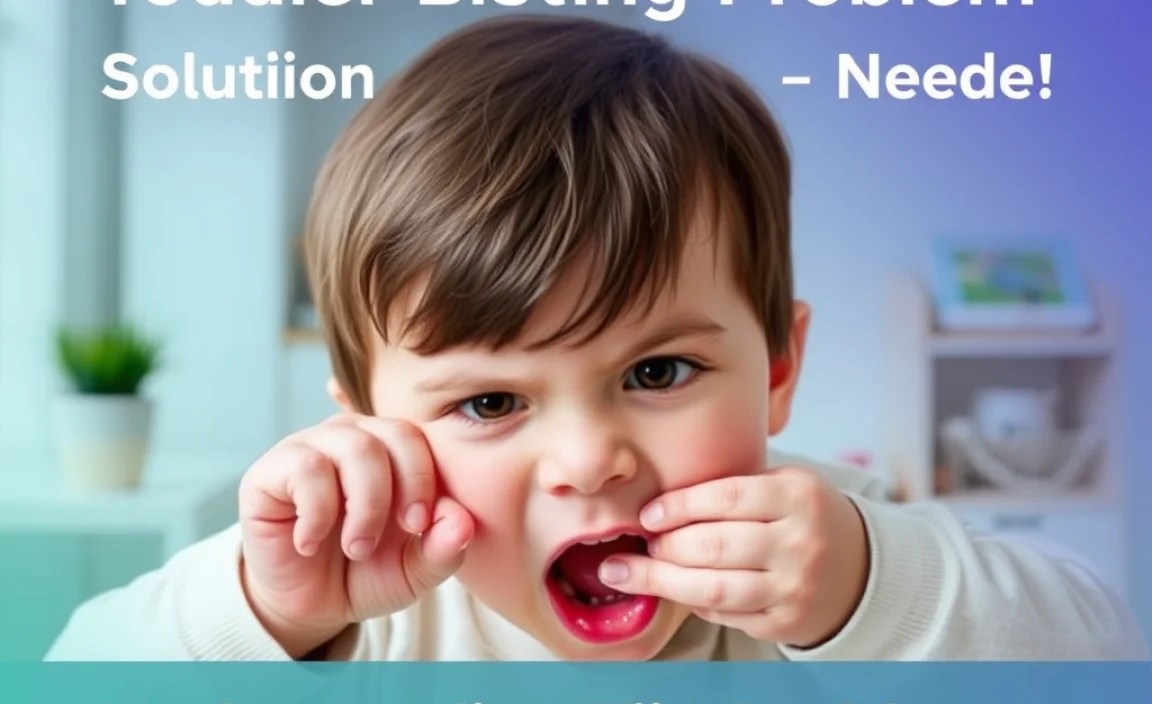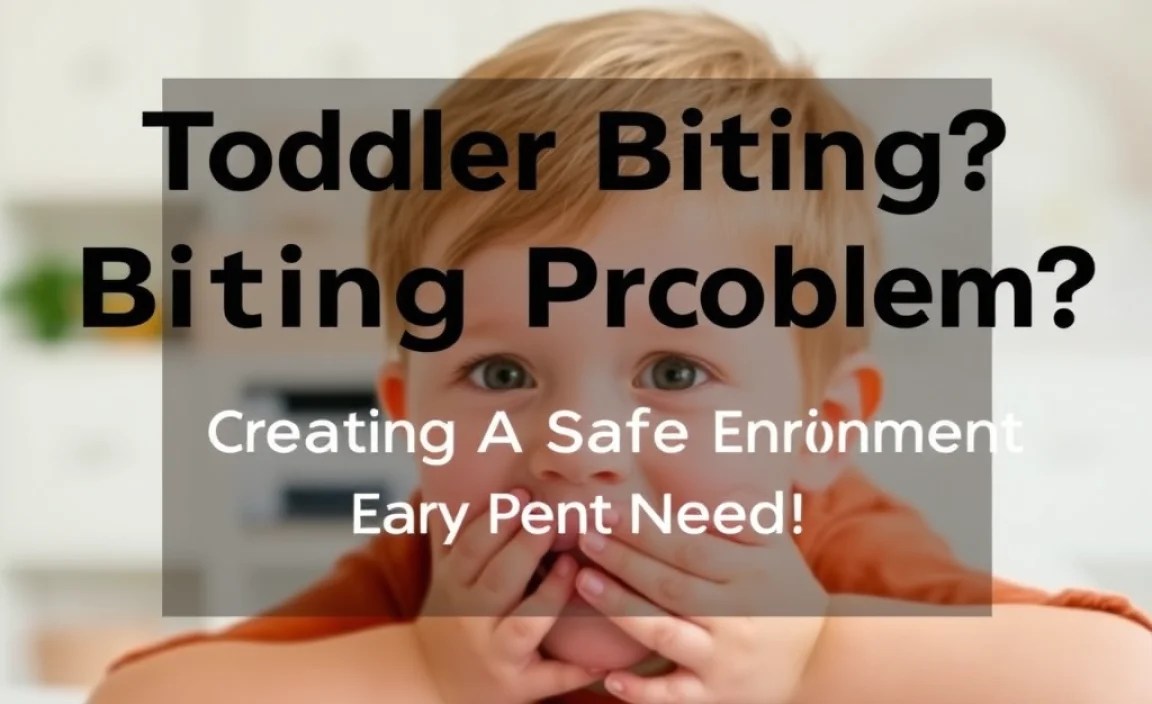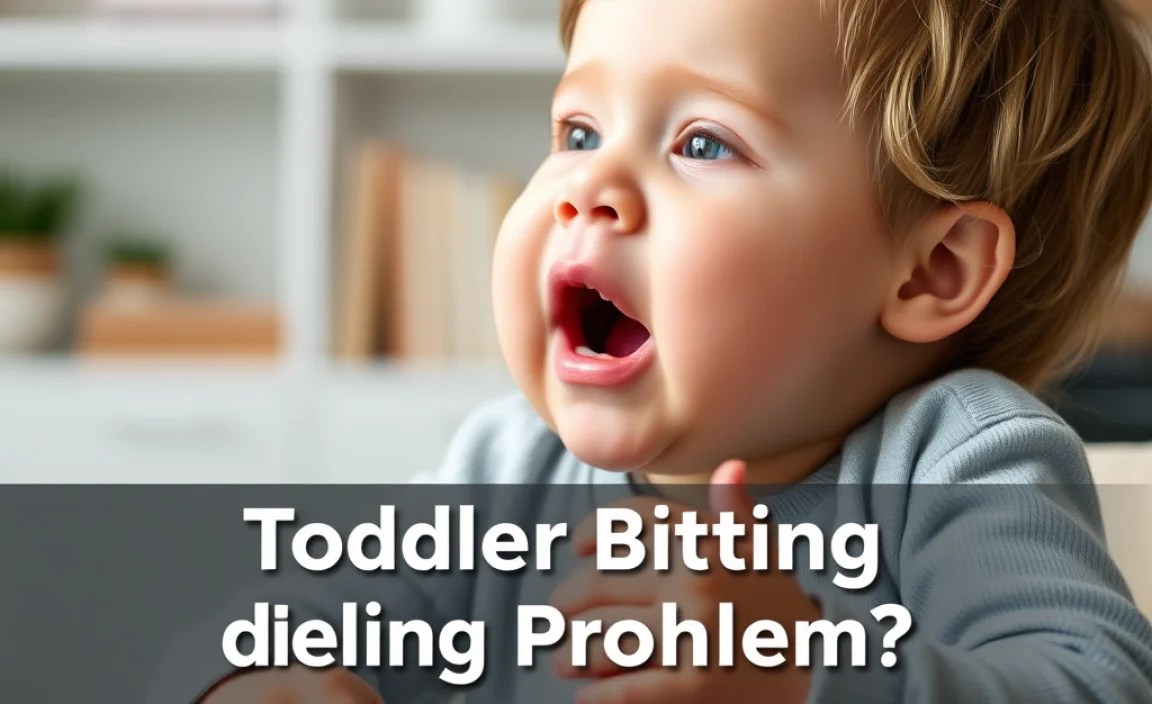Parents often face puzzling behavior from toddlers. One common issue is the toddler biting problem. Why do some toddlers bite? It might surprise you to know that biting is normal. It can be a way for toddlers to express themselves when they can’t use words. Are you curious about how to handle a biting toddler? Read on to find out!
At A Glance
Key Takeaways
- The toddler biting problem is common among young children.
- Understanding why toddlers bite is the first step to solving it.
- Encouraging communication helps reduce biting incidents.
- Safe environments prevent biting and other harmful behaviors.
- Patience and consistency are key in addressing the biting habit.
Understanding The Toddler Biting Problem

Many parents worry when their toddler starts biting. It’s important to know that biting is a normal phase. Toddlers bite because they are developing new skills. Biting can happen due to frustration, excitement, or even teething. When toddlers lack words to express themselves, they might resort to biting. Identifying the cause of biting is the first step in finding a solution.
- Toddlers may bite due to frustration.
- Excitement can also lead to biting.
- Teething causes discomfort that prompts biting.
- Lack of words often leads to biting.
- Identifying triggers helps address the problem.
Once you know why your toddler bites, you can take steps to stop it. Observing your child helps you understand their needs. If your toddler bites when teething, offer a teething toy. If biting occurs due to lack of words, encourage speech development. Addressing the root causes leads to better outcomes.
Fun Fact or Stats : About 2-3% of toddlers experience frequent biting.
Why Do Toddlers Bite?
Have you ever wondered why your toddler bites? Each child is different. Some bite due to teething pain. Others may bite because they can’t express their feelings. When toddlers feel overwhelmed, they might bite out of frustration. It’s a phase that many kids go through. With time and understanding, biting can be managed.
Signs Your Toddler Might Bite
How can you tell if your toddler is about to bite? Look for signs of frustration. A child may clench their fists or frown. Excited toddlers might jump or wave their arms. When you notice these signs, redirect their attention. Offer a toy or activity to distract them. Being attentive can prevent biting incidents.
Steps To Address Biting
Is your toddler biting others? Start by teaching them to use words. Encourage them to express feelings with simple phrases. Show them how to ask for help when upset. Always stay calm and consistent in your responses. Over time, toddlers learn better ways to communicate. Remember, patience is key.
Creating A Safe Environment

Safety is crucial in preventing the toddler biting problem. A safe environment reduces stress and biting incidents. Childproof your home to prevent accidents and injuries. Safe toys and activities keep children engaged. Supervision is important, especially during playtime. With a secure space, children feel more relaxed and bite less.
- Childproof your home for safety.
- Provide safe toys to prevent frustration.
- Engage children with fun activities.
- Supervise playtime to stop biting early.
- Reduce stress by maintaining a calm environment.
Creating a safe environment helps toddlers thrive. When children feel safe, they are less likely to bite. Encouraging positive interactions and play reduces stress. Safety measures also protect children from harm. By focusing on safety, you can help prevent biting and other unwanted behaviors.
Fun Fact or Stats : A well-childproofed home can prevent many common accidents.
How To Childproof Effectively
Do you know how to childproof your home? Start by removing sharp objects. Cover electrical outlets and secure loose wires. Use safety gates to block stairs and dangerous areas. Keep small items out of reach. These steps create a safer environment for your toddler. Remember, a childproofed home reduces stress and prevents biting.
Choosing Safe Toys For Toddlers
What are the best toys for toddlers? Look for toys that are age-appropriate and safe. Avoid small parts that can be swallowed. Choose toys that encourage learning and creativity. Soft materials are ideal for teething toddlers. Safe toys reduce frustration and lessen biting incidents. With the right toys, playtime is fun and safe.
The Importance Of Supervision
Why is supervision important? Watching your child helps prevent accidents and biting. Stay close during playtime to intervene if needed. Supervision allows you to guide positive interactions. It also helps you notice signs of frustration early. By supervising, you can redirect attention and avoid biting.
Teaching Communication Skills

Communication is key to solving the toddler biting problem. When children can express themselves, they bite less. Start by teaching simple words for emotions. Use picture books and songs to build vocabulary. Encourage children to ask for help when needed. Praise them for using words instead of biting. With improved communication, biting incidents decrease.
- Teach simple words for emotions.
- Use picture books to build vocabulary.
- Encourage asking for help.
- Praise using words over biting.
- Practice communication daily.
Improving communication skills takes time. Be patient and consistent in teaching. Celebrate small victories, like using words instead of biting. With practice, children learn to express themselves better. As communication improves, biting reduces. Helping your toddler communicate is a rewarding journey.
Fun Fact or Stats : Children learn new words each day, broadening their communication skills.
Building Vocabulary With Books
Do you read to your toddler daily? Books are a great tool for learning words. Choose colorful picture books to catch their interest. Point to pictures and name objects and emotions. Encourage your child to repeat words. Reading together builds vocabulary and strengthens bonds. It’s a fun way to prevent biting by improving expression.
Using Songs And Rhymes
Why are songs and rhymes effective? Music makes learning fun. Songs teach words and phrases in a playful way. Rhymes help children remember new words. Sing together and encourage participation. It’s an enjoyable method to improve language skills. With more words, toddlers find better ways to express feelings.
Encouraging Expression Of Feelings
How can you help your child express feelings? Start by naming emotions. Use simple words like happy, sad, or angry. Encourage your child to tell you how they feel. Provide a safe space for them to talk. When toddlers can express their feelings, they bite less. Practice this often to see improvement.
Consistency In Parenting

Consistency helps solve the toddler biting problem. Set clear rules and follow them every time. When biting occurs, respond in the same way. Use calm words to explain why biting is wrong. Praise positive behavior and encourage non-biting alternatives. Consistent actions lead to better understanding and less biting.
- Set clear rules for behavior.
- Respond consistently to biting.
- Explain why biting is wrong.
- Praise good behavior often.
- Encourage non-biting alternatives.
Being consistent takes effort but pays off in the long run. Children learn from repetition and routine. A consistent approach helps set expectations. As toddlers learn what is expected, they are less likely to bite. Remember, consistency is a key ingredient in effective parenting.
Fun Fact or Stats : Routine and consistency reduce stress for both children and parents.
The Importance Of Routine
Why is routine important for toddlers? A routine provides structure. It helps children know what to expect. When toddlers have a routine, they feel secure. Routines reduce anxiety and help manage behavior. By sticking to a plan, toddlers are less likely to bite.
Responding Calmly To Biting
How should you respond to biting? Stay calm and composed. Avoid shouting or harsh reactions. Explain using simple words why biting is not okay. Encourage your child to use words instead. A gentle approach helps children learn better ways to express themselves.
Praising Positive Behavior
Why is praising important? Positive reinforcement encourages good behavior. Praise your child when they use words or share toys. Highlight their efforts and be specific. This boosts confidence and motivates them to repeat positive actions. Consistent praise reduces biting incidents over time.
Handling Emotions And Frustration

Helping toddlers manage emotions is vital in tackling the toddler biting problem. Teach them to identify and express feelings. Use play to show that it’s okay to have emotions. Provide outlets like drawing or playing music to express feelings. Show empathy and understanding when they are upset. With support, toddlers can learn to handle emotions better.
- Teach identifying emotions.
- Use play to express feelings.
- Provide creative outlets.
- Show empathy and understanding.
- Encourage talking about emotions.
Handling emotions is a skill that develops over time. Be patient and supportive as your toddler learns. Validate their feelings and provide comfort when needed. Recognizing and managing emotions helps reduce biting. It’s a journey that strengthens bonds between parents and children.
Fun Fact or Stats : Creative activities like drawing can help reduce stress in children.
Using Play To Teach Emotions
Do you use play to teach emotions? Play is a powerful tool for learning. Use dolls or puppets to act out feelings. Show happy, sad, and angry expressions. Ask your child to mimic these emotions. Play helps children understand and express their own feelings.
Creative Activities For Expression
How can creative activities help? Art and music are great outlets for emotions. Provide crayons, paint, and paper for drawing. Encourage your child to express how they feel through art. Playing music or dancing also helps. These activities channel emotions into positive expression.
The Role Of Empathy In Parenting
Why is empathy important? Showing empathy helps children feel understood. Acknowledge their feelings and offer comfort. Use phrases like, “I see you’re upset.” Empathy builds trust and connection. When children feel supported, they handle emotions better and bite less.
Conclusion
The toddler biting problem is a phase that many children experience. Understanding why toddlers bite is the first step. Creating a safe environment and teaching communication are key. Consistency and empathy help manage this behavior. With patience and love, toddlers learn better ways to express themselves.
FAQs
Question: Why does my toddler bite when playing with others?
Answer: Toddlers might bite during play due to excitement or frustration. They are still learning how to interact with peers. Encourage communication and guide them on sharing toys. Redirection and close supervision can prevent biting incidents. Over time, toddlers learn to play more peacefully.
Question: How can I stop my toddler from biting other children?
Answer: Start by understanding why your toddler bites. Encourage them to use words instead of biting. Create opportunities for them to express their feelings. Consistent responses and praising positive behavior help. Over time, these measures reduce the toddler biting problem.
Question: Is biting a sign of a bigger issue?
Answer: Biting is usually a normal developmental phase. It’s common among toddlers learning to express themselves. However, if the biting is severe or frequent, consult a pediatrician. They can assess if there’s an underlying issue. Addressing concerns early leads to better outcomes.
Question: What should I do if my toddler bites me?
Answer: Stay calm and avoid harsh reactions. Explain using simple words why biting is not okay. Encourage your toddler to use words instead of biting. Redirect their attention to safe activities. Consistent responses help them learn better ways to communicate.
Question: How can I teach my toddler to express emotions?
Answer: Start with simple emotion words like happy, sad, or angry. Use books and songs to build vocabulary. Encourage your toddler to tell you how they feel. Provide creative outlets like drawing or music for expression. Practice often and celebrate their progress.
Question: Are some toddlers more likely to bite than others?
Answer: Yes, each child is different. Some bite more due to teething, frustration, or excitement. Understanding triggers helps in addressing the behavior. Observing your child’s cues and responses is important. Tailored approaches lead to more effective solutions.